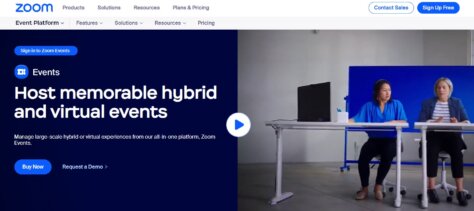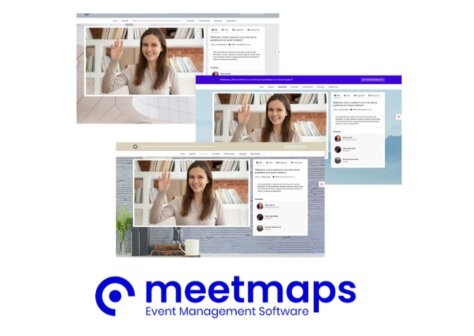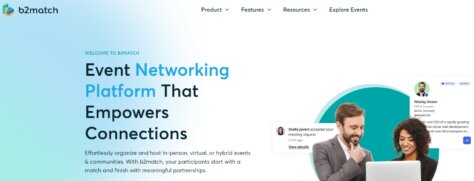Hybrid events represent an evolution in how we experience and participate in events. By combining the physical with the virtual, these events offer a unique dynamic that unites audiences from diverse locations into a shared experience.
In the era of global connectivity, hybrid events represent a natural evolution in how we conceive interaction, participation, and collaboration. These events have emerged as a bridge between the physical and the virtual, redefining the experience of attending conferences, trade shows, presentations, and professional meetings.
Beyond being a response to the constraints imposed by the pandemic, hybrid events have demonstrated their potential to reinvent the very nature of human interaction and knowledge dissemination.
Benefits of hybrid events
Hybrid events offer a series of significant advantages. They enable reaching a wider audience by overcoming geographical barriers and provide flexibility to attendees, allowing them to participate from anywhere with internet access.
Flexibility is one of the fundamental pillars of hybrid events. By combining physical presence with remote participation, these events considerably expand reach and accessibility. Geographical barriers fade away, allowing a diverse and global audience to join the same event regardless of their location. This inclusive approach opens doors to a diversity of ideas, perspectives, and collaborations that enrich the overall experience. It extends the accessibility and diversity of the audience, generating greater reach and interaction.
On the other hand, adaptability is also a great benefit. Hybrid events allow adjusting the event’s dynamics in real-time. This means organizers can modify the agenda, include additional sessions, or interact with the audience in innovative ways on the go, thus maximizing engagement and interaction.
Moreover, data collection and advanced analytics are areas where hybrid events shine. The digital platforms involved in these events offer detailed metrics on participation, interests, and attendee behavior, providing valuable feedback to enhance future experiences and personalize content based on audience preferences.
Considerations for choosing a platform or tool for hybrid events
When selecting a platform to manage hybrid events, it’s crucial to consider several aspects:
- The platform’s interface and usability are fundamental to ensure a smooth experience for both event managers and virtual attendees.
- Integration capability with interaction tools such as real-time surveys, chat rooms, polls, Q&A sessions, etc., to enhance participation, interaction, and the overall audience experience.
- Streaming quality is another key factor. Ensuring the platform can handle high-quality video transmission without interruptions is essential to maintain audience engagement.
- Content customization capability so that the company/brand hosting the event can personalize the content with its logo, corporate colors, and corresponding style. As in other types of events, branding shouldn’t be overlooked to reinforce corporate image.
- Data security and privacy are top priorities when choosing a platform. Ensuring the platform complies with security standards to protect attendees’ information is crucial.
And to conclude this section, it’s also relevant to highlight the platform’s capability to live stream the event simultaneously on other channels—be it social media or the company’s website—since this functionality is highly valued by event organizers looking to share it openly.
The best platforms for hybrid events in the market
Watchity
Watchity focuses on the production and streaming of live events, whether physical, virtual, or hybrid, offering a comprehensive solution to create real-time content.
It stands out for promoting audience participation by maximizing engagement, production quality, platform versatility to edit, customize, and share content, and allowing complete event management from start to finish (registrations, landing pages, registration emails, reminders, live production, content distribution, results analytics, etc.).
Key features for hybrid events:
- Live production with multiple cameras and content customization options.
- Seamless integration with external applications or platforms and social networks.
- Real-time interaction tools for remote and in-person audiences.
- Detailed analytics to assess event performance.
Regarding pricing, Watchity offers different plans to adapt to each client’s specific needs or types of events. You can check here the functionalities included in each plan or contact our team to explain your use case in detail.
Hopin
Hopin is a comprehensive platform for online and hybrid events that focuses on providing an immersive experience for attendees, both remote and in-person. It offers a variety of tools for conferences, trade shows, and networking.
Key features for hybrid events:
- Customizable virtual stages for live and in-person presentations.
- Networking tools like meeting rooms and group chats.
- Support for multiple event tracks and simultaneous sessions.
- Detailed participation analytics and statistics.
Hopin offers various pricing plans depending on the event’s size and needs, with flexible pricing options.
Zoom Events
Zoom Events is an extension of the Zoom video conferencing platform, focused on organizing virtual, hybrid, and in-person events. It integrates Zoom functionalities with specific event tools.
Key features for hybrid events:
- Capacity for online, hybrid, or fully in-person events.
- Virtual meeting rooms for parallel sessions and networking.
- Integration with familiar Zoom functionalities like polls and chat.
- Registration management and participation analysis.
Regarding pricing, Zoom offers flexible plans based on the event’s needs and the number of attendees.
Meetmaps
Meetmaps combines in-person and virtual events, offering tools for comprehensive management of conferences, conventions, and trade shows. It focuses on customizing the user experience and facilitating interaction between remote and in-person attendees.
Key features for hybrid events:
- Customized agendas and scheduling for in-person and online events.
- Networking modules for connections between virtual and in-person attendees.
- Survey functions and user experience evaluation.
- Participation tracking and detailed analysis.
Meetmaps offers different pricing plans tailored to the specific needs of the event.
B2match
B2match is an all-in-one networking platform for events that caters to all the needs of its hybrid events. It offers a virtual events solution featuring advanced hybrid networking functions for events, high-speed streaming, live integration, integrated ticketing, and online payment, as well as quick chat and messaging.
B2match uses an AI-powered event match-making algorithm that filters event attendees, providing a clear picture of the in-person audience and remote viewers, primarily for connecting the best business matches.
B2match also has a mobile networking app for events that serves as a conduit between the audience, mainly for integrated chat before and during the event, while also keeping attendees informed about agenda updates, new meeting notifications, and giving them access to the meeting list with all relevant meeting information (even the venue map).
Pricing:
Their prices are based on the volume of participants with a minimum contract period of 12 months. They offer 3 plans:
- Basic: for one event per year and 100 participants
- Professional: for unlimited events per year and 500 participants
- Custom: for organizations needing a tailor-made solution
Cvent
Cvent is a comprehensive event management platform that adapts to both in-person and virtual events, offering tools for event planning, promotion, and execution.
Key features for hybrid events:
- Complete event lifecycle management, from planning to post-event tracking.
- Attendee experience customization and networking tools.
- Registration and ticket sales capabilities, as well as ROI tracking.
- Detailed analytics to evaluate event success.
Cvent’s prices vary depending on the event’s specific needs and required functionalities.

And that concludes our article on the best platforms for hybrid events.
Despite the diversity of available platforms, the success of a hybrid event lies in the right combination of technology, audience engagement, and comprehensive strategic planning. Choosing the right platform is just the first step; the real magic unfolds by making the most of its capabilities to create memorable and valuable experiences for all attendees, regardless of their geographical location or preference for virtual or in-person attendance.
It’s clear that the world of events has undergone a significant evolution with the arrival of the hybrid model. Flexibility, accessibility, and the ability to reach global audiences are just the beginning of this change. Hybrid events not only represent an evolution in how we gather but also an opportunity for innovation and connection at previously unexplored levels. By embracing this new model, companies and organizers not only expand their reach but also redefine how we interact, learn, and connect in an increasingly digitally connected world.







